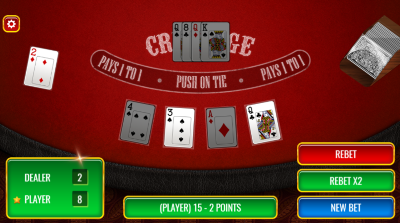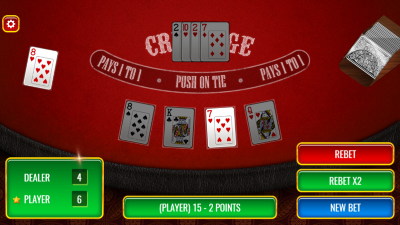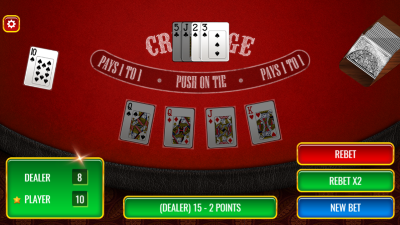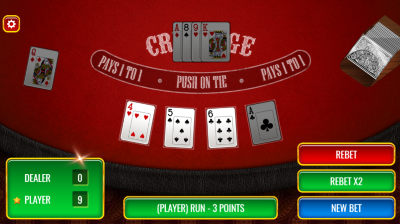On this page
Cribbage
Introduction
Cribbage is normally defined as a card game played between two to four people with the goal of reaching 120 points. It is one of those games that is almost always played for money but usually small friendly amounts. I must have played in the thousands of games while I was in college. Unfortunately, since I graduated, I've been searching for 30 years for somebody to play with. It can be difficult these days finding anyone who knows the rules. Sadly, its a dying game. Sad because it is very exciting, social, and a lot of fun.
A few times over the years I've seen game inventors trying to sell their casino-ready version of cribbage. I write about one such entrepreneur in my report on the 2014 Raving table game show. As much as I respect trying to do something new in the table games sphere, I know on site the attempt is doomed to failure as cribbage is simply too complicated to quickly explain to a new player and those who do know the rules are dying off by the day.
While it may not appear at the Mirage anytime soon, you can now play a cribbage variant against the dealer at Internet casinos using 1x2 gaming software. Unlike the real game, there is no discarding, so it is completely a game of luck. So don't worry about throwing away the wrong card or counting your hand wrong. Just click the deal button and enjoy.
Rules
Following are the rules of the Cribbage game offered by 1x2.
- A single 52-card deck is used with no jokers.
- Aces are worth one point, 2 to 10 according to pip value, and faces cards as 10 points.
- The order of the cards, for purposes of straights, is the same as in poker, except aces are low only.
- The object is to have more points than the dealer.
- If the player has more points, his wager will be paid 1 to 1 odds. If the dealer has more points, the wager will lose. An equal number of points will result in a push.
- Both the player and dealer shall each receive four cards. There shall also be one community card, which the game calls the Crib Card, which may be used by both players.
- There are various ways of earning points, as follows:
- Any set of two or more cards totaling a count of 15. For example, a queen and 5. A count of 15 is worth 2 point for purposes of scoring the hand.
- Any pair is worth two points.
- Any straight of three to five total cards. The number of points is equal to the number of cards in the straight.
- A flush of four or five cards. For a four-card flush, all four cards must be in the player's own hand, as opposed to being the shared Crib Card. A five-card flush must obviously use all five cards. The number of points is equal to the number of cards in the flush.
- If Crib Card is a jack, then the dealer shall be awarded an extra two points.
- A single card can be used multiple times as long as each set is different or pays for a different reason. For this reason, a three of a kind is worth six points, because there are three ways to two choose two cards to form a pair out of three and each pair is worth two points. Likewise, a four of a kind is worth 12 points, because there are six ways to choose two cards out of four, and each way is worth two points. Also note that 4-5-6 can be counted twice, once as a three-point straight and another as two points for a total of 15.
The house edge comes only from the rule that if the Crib Card is a jack then the dealer will get an extra two points.
Examples
If the rules above scream out for an example, then I hope the following will help to clarify them. The player hand is on the bottom, the dealer hand on top, and the Crib Card on the left.

In the hand above the player has 8 points, as follows:
- A-2-3-4 straight for four points.
- Q-A-4 total count of 15 for two points.
- Q-2-3 total count of 15 for two points.
The dealer has only two points for the pair of queens.

In the hand above the player has 6 points, as follows:
- 8 (of hearts)-7 total of 15 for two points.
- 8 (of spades)-7 total of 15 for two points.
- Pair of eights for two points.
The dealer has two points for the 8-7 and another two for the pair of deuces for a total of four points.

In the hand above the player has ten points, as follows:
- 10-J-Q (of diamonds)-K straight for four points.
- 10-J-Q (of spades)-K straight for four points.
- Pair of queens for two points.
The dealer has 15 points four different ways (5-10, 5-J, 2-3-10, 2-3-J). Each is worth two points for a total of eight points.

In the hand above the player has nine points, as follows:
- 4-5-6 straight for three points.
- 4-5-6 count of 15 for two points.
- Q-5 for a total of 15 for two points.
- Q-4-A for a total of 15 for two points.
The dealer has zero points.
Analysis
I haven't analyzed the game yet but the help file claims a return of 97.2%. It is easy to calculate that the probability the dealer will get an extra two points for a jack as the Crib Card is 4/52. A little algebra tells us that when there is a jack as the Crib Card, the player can expect to lose 36.4% of his bet. If we ignore pushes, the probability of winning against a jack as the Crib Card is 31.8%.
External Links
- Wizard of Vegas -- Discussion about Cribbage


